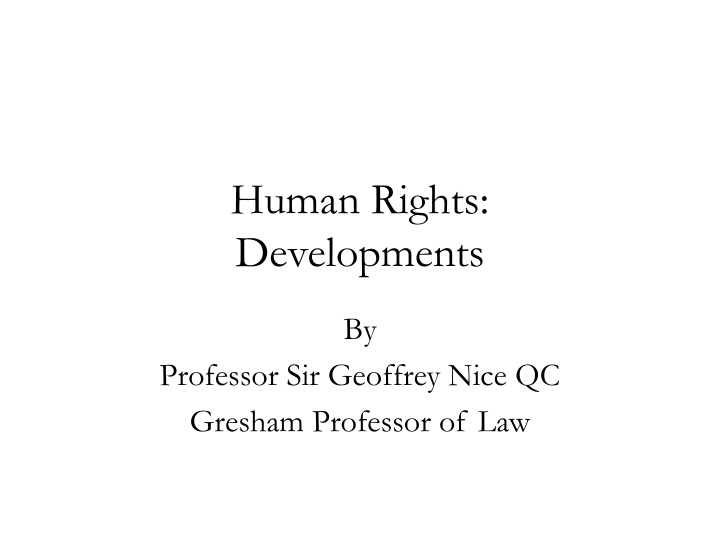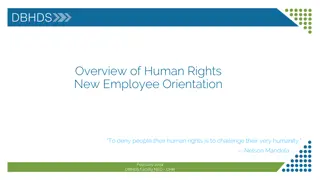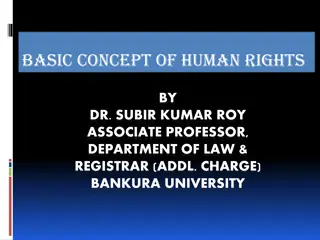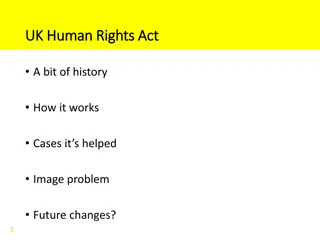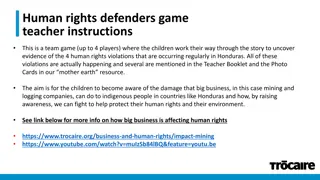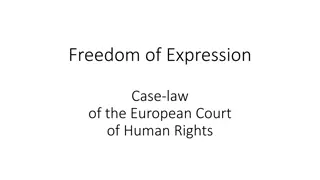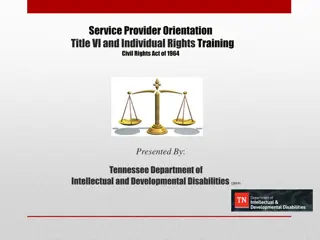Human Rights Developments and the Impact of Dr. Mads Gilbert
Explore the latest human rights developments through the insights of Professor Sir Geoffrey Nice QC and the experiences shared by Dr. Mads Gilbert in addressing urgent medical needs amidst conflicts. While Dr. Gilbert faces opposition, his dedication to humanitarian work shines through in his determination to aid those in Gaza despite challenges.
Uploaded on Sep 13, 2024 | 0 Views
Download Presentation

Please find below an Image/Link to download the presentation.
The content on the website is provided AS IS for your information and personal use only. It may not be sold, licensed, or shared on other websites without obtaining consent from the author.If you encounter any issues during the download, it is possible that the publisher has removed the file from their server.
You are allowed to download the files provided on this website for personal or commercial use, subject to the condition that they are used lawfully. All files are the property of their respective owners.
The content on the website is provided AS IS for your information and personal use only. It may not be sold, licensed, or shared on other websites without obtaining consent from the author.
E N D
Presentation Transcript
Human Rights: Developments By Professor Sir Geoffrey Nice QC Gresham Professor of Law
Dr Mads Gilbert We still have lakes of blood on the floor in the emergency room, piles of dripping blood soaked bandages to clear out. Cleaners are everywhere swiftly shoveling the blood and discarded tissues, hair, clothes, cannulas, and the leftovers from death all taken away to be prepared again to be repeated all over.
Dr Mads Gilbert It is completely unacceptable to restrict the movement of humanitarian personnel much needed in Gaza now after the last bombardment, he said. I will not be stopped from returning to Gaza to do medical work. There are different attempts going on to conceal the reality on the ground for the good people of Gaza this is one of them and we must persist in resisting attempts to shutdown Gaza from the world.
An Israeli foreign ministry spokesman, Paul Hirschson Dr Gilbert was not on the side of decency and peace and he s got a horrible track record. I wouldn t be surprised if his acquaintances are among the worst people in the world.
The Human Rights Act 1998 An Act to give further effect to rights and freedoms guaranteed under the European Convention on Human Rights; Introduction The Convention Rights. In this Act the Convention rights means the rights and fundamental freedoms set out in Articles 2 to 12 and 14 of the Convention,
Interpretation of legislation. So far as it is possible to do so, primary legislation and subordinate legislation must be read and given effect in a way which is compatible with the Convention rights Declaration of incompatibility. ...in any proceedings in which a court determines whether a provision of primary legislation is compatible with a Convention right. If the court is satisfied that the provision is incompatible with a Convention right, it may make a declaration of that incompatibility.
Article 2 Right to life Everyone s right to life shall be protected by law. No one shall be deprived of his life intentionally save in the execution of a sentence of a court following his conviction of a crime for which this penalty is provided by law. Article 3 Prohibition of torture No one shall be subjected to torture or to inhuman or degrading treatment or punishment. Article 4 Prohibition of slavery and forced labour. No one shall be held in slavery or servitude. No one shall be required to perform forced or compulsory labour. Everyone who is deprived of his liberty by arrest or detention shall be entitled to take proceedings by which the lawfulness of his detention shall be decided speedily by a court and his release ordered if the detention is not lawful.
Article 5 Right to liberty and security Everyone has the right to liberty and security of person. No one shall be deprived of his liberty save in the following cases and in accordance with a procedure prescribed by law: Everyone who is arrested shall be informed promptly, in a language which he understands, of the reasons for his arrest and of any charge against him. Everyone arrested or detained in accordance with the provisions of paragraph 1(c) of this Article shall be brought promptly before a judge or other officer authorised by law to exercise judicial power and shall be entitled to trial within a reasonable time or to release pending trial. Release may be conditioned by guarantees to appear for trial
Article 6 Right to a fair trial Article 7 No punishment without law Article 8 Everyone has the right to respect for his private and family life, his home and his correspondence.
Article 9 Freedom of thought, conscience and religion Article 10 Freedom of expression Article 11 Freedom of assembly and association Article 12 Right to marry Men and women of marriageable age have the right to marry and to found a family, according to the national laws governing the exercise of this right.
Article 14 Prohibition of discrimination. The enjoyment of the rights and freedoms set forth in this Convention shall be secured without discrimination on any ground such as sex, race, colour, language, religion, political or other opinion, national or social origin, association with a national minority, property, birth or other status. The First Protocol Article 1 Protection of property Article 3 Right to free elections PART 3 ARTICLE 1 OF THE THIRTEENTH PROTOCOL The death penalty shall be abolished. No one shall be condemned to such penalty or executed
United Kingdom Independence Party UKIP will withdraw from the jurisdiction of the European Court of Human Rights. UKIP will reverse the government s opt-in to EU law and justice measures, including the European Arrest Warrant and European Investigation Order. We will replace the EAW with appropriate bi-lateral agreements. UKIP will not give prisoners the vote. We will repeal the Human Rights Act and replace it with a new British Bill of Rights. The interests of law-abiding citizens & victims will always take precedence over those of criminals.
CONSERVATIVE PARTY In future, the UK courts will interpret legislation based upon its normal meaning and the clear intention of Parliament, rather than having to stretch its meaning to comply with Strasbourg case-law. Limit the use of human rights laws to the most serious cases. The use of the new law will be limited to cases that involve criminal law and the liberty of an individual, the right to property and similar serious matters. There will be a threshold below which Convention rights will not be engaged, ensuring UK courts strike out trivial cases. We will work with the devolved administrations and legislatures as necessary to make sure there is an effective new settlement across the UK.
CONSERVATIVE PARTY For instance: We will set out a clearer test in how some of the inalienable rights apply to cases of deportation and other removal of persons from the United Kingdom. The ECtHR has ruled that if there is any real risk (by no means even a likelihood) of a person being treated in a way contrary to these rights in the destination country, there is a bar on them being sent there, giving them in substance an absolute right to stay in the UK. Our new Bill will clarify what the test should be, in line with our commitment to prevent torture and in keeping with the approach taken by other developed nations.
CONSERVATIVE PARTY The Convention recognises that people have civic responsibilities, and allows some of its rights to be restricted to uphold the rights and interests of other people. Our new Bill will clarify these limitations on individual rights in certain circumstances. So for example a foreign national who takes the life of another person will not be able to use a defence based on Article 8 to prevent the state deporting them after they have served their sentence. Prevent our laws from being effectively re-written through interpretation
The Charter of Fundamental Rights of the EU brings together in a single document the fundamental rights protected in the EU. The Charter contains rights and freedoms under six titles: Dignity, Freedoms, Equality, Solidarity, Citizens' Rights, and Justice. Proclaimed in 2000, the Charter has become legally binding on the EU with the entry into force of the Treaty of Lisbon, in December 2009. Why the EU Charter of Fundamental Rights exists The rights of every individual within the EU were established at different times, in different ways and in different forms.
For this reason, the EU decided to clarify things and to include them all in a single document which has been updated in the light of changes in society, social progress and scientific and technological developments: this document is the Charter of Fundamental Rights of the European Union . It entrenches: all the rights found in the case law of the Court of Justice of the EU; the rights and freedoms enshrined in the European Convention on Human Rights other rights and principles resulting from the common constitutional traditions of EU countries and other international instruments
The Charter sets out a series of individual rights and freedoms. The Charter is a very modern codification and includes 'third generation' fundamental rights, such as: data protection; guarantees on bioethics; and transparent administration The Charter is consistent with the European Convention on Human Rights adopted in the framework of the Council of Europe: when the Charter contains rights that stem from this Convention, their meaning and scope are the same.
PREAMBLE The peoples of Europe, in creating an ever closer union among them, are resolved to share a peaceful future based on common values. Conscious of its spiritual and moral heritage, the Union is founded on the indivisible, universal values of human dignity, freedom, equality and solidarity; it is based on the principles of democracy and the rule of law. It places the individual at the heart of its activities, by establishing the citizenship of the Union and by creating an area of freedom, security and justice. To this end, it is necessary to strengthen the protection of fundamental rights in the light of changes in society, social progress and scientific and technological developments by making those rights more visible in a Charter.
Article 3 Right to the integrity of the person Everyone has the right to respect for his or her physical and mental integrity. In the fields of medicine and biology, the following must be respected in particular: the free and informed consent of the person concerned, according to the procedures laid down by law, the prohibition of eugenic practices, in particular those aiming at the selection of persons, the prohibition on making the human body and its parts as such a source of financial gain, the prohibition of the reproductive cloning of human beings.
Which of these rights, I ask, would we wish to discard? Are any of them trivial, superfluous, unnecessary? Are any of them un-British? There may be those who would like to live in a country where these rights are not protected, but I am not of their number. LORD BINGHAM
Future Law Lectures Cases I Have Known 04 March 2015 Srebrenica: Genocide and Trial 01 April 2015 Srebrenica: Justice and Legacy 06 May 2015
